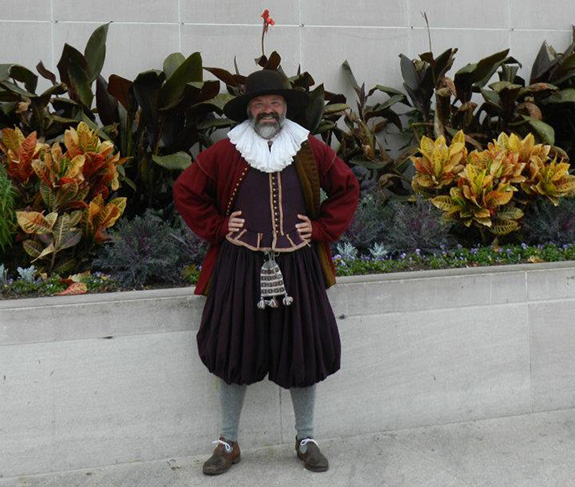Pilgrims on Parade at the American History Museum
Pilgrim interpreters from the Plimoth Plantation arrive at the National Museum of American History
![]()

Deputy Director of the Plantation, Richard Pickering poses as Mayflower pilgrim. Image courtesy of the NMAH.
Richard Pickering and Kathleen Wall have been telling the same story for the past 25 years. Some might say, they are living in the past. But then again, as pilgrim interpreters from the Plimoth Plantation, playing the part of the original Mayflower settlers is their job.
This Sunday, November 11, Pickering and Wall will tell the story once more at the National Museum of American History, wearing the buckles and ruffles and dispelling the Thanksgiving myths and traditions as though they were the real deal, the 17th-century pilgrims Richard and Elizabeth Warren.
Warren was among those to arrive on the Mayflower and touch soil at Cape Cod, Massachusetts on November 11, 1620—exactly 392 years ago, next Sunday. His wife Elizabeth arrived three years later with their five children, and so the performance takes place in the year 1627, when the couple is living in the new colony.
Pickering, who is the deputy director of the plantation and a specialist in the food and culinary of the first colony, emphasizes the respect he has for those who survived the first settlement. Half of the community died within three months. Governor Bradford noted that during the first February in the new world, two or three people were dying daily. With these facts in mind, Pickering tells the tale of the first Thanksgiving with the grim accuracy of the colony’s hardships and travails.
“When you really think about these factors, there’s that sense of here you are—the edge of the civilized world. When you’re recreating someone else’s life, honoring that life by representing it in 360-degrees, you never accept a generalization—you are a living biography,” Pickering says. “Generalizations are difficult to swallow when you begin to look at individual.”
At the start of the program, which is presented as part of the American History Museum’s Historic Theater program, Pickering will give background information as his modern self, before slipping into his historic persona. Pickering will answer from both perspectives throughout the discussion. He says the best way to tell the difference between modern Richard and past Richard is in the 17th century English dialect. In early Plymouth there were 17 different dialects. Working for Plimoth Plantation, interpreters like Pickering must master the regional dialect for each character he or she plays. Interestingly, the performers have had to change up their roles. With graying hair and wrinkles, they step into a new new character.
“I let people know which Richard is talking by dialect and with my hat,” Pickering says. “As soon as the hat goes on, that’s an indication the character is present.”
His favorite part of interpreting is opening modern eyes to how different life was for people in the past, he says.
“They’re not just us in funny clothing,” Pickering says. “It helps us to understand the spiritual and educational framework of people in the past. We often make judgements and ask ‘Why did they do that?’ and we dismiss them. Role playing helps us to understand different ways to perceive the world—past and present.”
Pickering and Wall enjoy answering questions after the performance. One of the funniest experiences from last year, Pickering says, took place during the last role play of the day. A little girl wanted to know how old Richard Warren was.
“I said to her ‘I guess I’m about 49 or 50.’ and she exclaimed ‘You don’t know?’ I tried explaining to her that people didn’t know the day they were born at that time—you knew the season, but it was unlikely you knew the date. She immediately said ‘NO BIRTHDAY CAKE?’ She was totally shocked that I didn’t know my birthday and that I wasn’t going to get a cake.”
Pickering says the story he tells year after year is not just a fun exercise in make believe.
“For me, this place is the story of every American,” he says. “This is your story too.”
Richard Pickering will be performing in the Price of Freedom Theater, Third Floor, East Wing at the National Museum of American History, November 11, 10:30, 11:30, 2:30 and 4:30. Pilgrim Food with Kathleen Wall is at 12:30, 1:30 and 3:30.
/https://tf-cmsv2-smithsonianmag-media.s3.amazonaws.com/accounts/headshot/561436_10152738164035607_251004960_n.jpg)
/https://tf-cmsv2-smithsonianmag-media.s3.amazonaws.com/accounts/headshot/561436_10152738164035607_251004960_n.jpg)